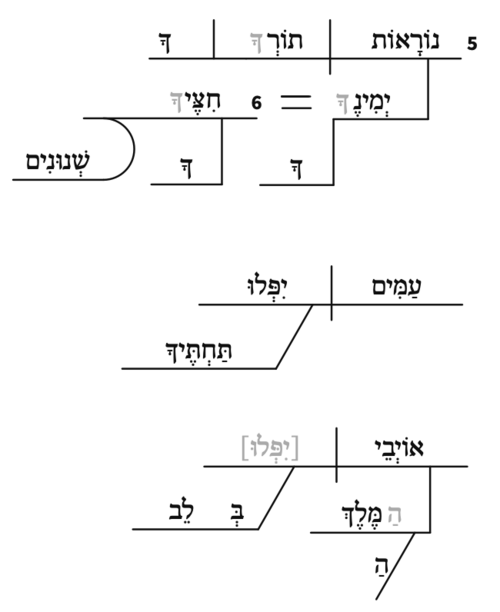The Division and Syntax of Ps. 45:6
Back to Psalm 45
Introduction
Ps 45:6 (MT) reads as follows:
- חִצֶּ֗יךָ שְׁנ֫וּנִ֥ים
- עַ֭מִּים תַּחְתֶּ֣יךָ יִפְּל֑וּ
- בְּ֝לֵ֗ב אוֹיְבֵ֥י הַמֶּֽלֶךְ׃
Rendered word-for-word, this can be translated as:
- "Your arrows [are] sharp.
- Nations fall under you,
- in the heart of the enemies of the king."
The main difficulty in this verse lies in the final prepositional phrase (v. 6c), "in the heart of the enemies of the king." It is unclear what the phrase modifies. Most modern versions think that the phrase in v. 6b is modifying the clause in v. 6a and either rearrange the lines of the verse or supply a second "your arrows":
- Your arrows are sharp in the heart of the king’s enemies; the peoples fall under you. (RSV)
- Your arrows are sharp; The peoples fall under You; Your arrows are in the heart of the King’s enemies. (NASB)
Other translations have tried to make sense of the verse in other ways (cf. TOB, GNB), and some scholars have despaired of finding a solution altogether. As one commentator has claimed, “the last line of v 6 defies final solution."[1]
Three possible solutions are as follows:
- Textual emendation: “May your pointed arrows frighten (יָחֵתו) nations, May the enemies of the king lose heart" (cf. GNB).[2]
- Unit redivision: either as a) Verse re-division (i.e. does not follow MT versification): [v. 5b] "Then may your right hand show you wondrous deeds, [v. 6] your arrows sharpened; peoples shall fall beneath you, in the midst of the king’s enemies" (cf. TOB).[3] or as b) Clause re-division (does not follow MT accentuation): the vb. יִפְּלוּ belongs to the phrase that follows, "Your arrow are sharp. Peoples are under you. They [the arrows] fall in the heart of the king's enemies."
- Vertical grammar with parenthesis: "Your arrows are sharp in the heart of the enemies of the king; peoples fall beneath you" (so most translations).
Argument Maps
Textual Emendation
The first possible solution is to emend the text: “May your pointed arrows frighten (יָחֵתו) nations, May the enemies of the king 'lose heart' (יפל לב)" (Kraus). This emendation reads תַּחְתֶּיךָ (under you) as יחתו (may they frighten), and יִפְּלוּ בְּלֵב (they fall / in heart) as יפל לב (it falls / heart).[4]
Click 'Expand' to see grammatical diagram.
===
model:
removeTagsFromText: true
shortcodes:
":C:": {unicode: "🄲"}
":G:": {unicode: "🄶"}
":A:": {unicode: "🄰"}
":I:": {unicode: "🄸"}
":L:": {unicode: "🄻"}
":D:": {unicode: "🄳"}
":M:": {unicode: "🄼"}
selection:
excludeDisconnected: false
dot:
graphVizSettings:
rankdir: LR
concentrate: true
ranksep: 0.2
nodesep: 0.2
===
[Emendation]: The text of MT Ps 45:6 is corrupt: the PP תַּחְתֶּיךָ ("under you") should be emended to יָחֵתו ("frighten," from the root חתת) and יִפְּלוּ בְּלֵב ("will fall, in heart") should be emended to יפל לב ("heart will fall") (Kraus 1988: 450-451 :C:). #dispreferred
+ <Contextually appropriate meaning>: The preceding verse (v. 5) mentions the king's נוֹרָאוֹת (fearful deeds), which uses a verbal root (ירא, to fear) that frequently co-occurs with the verbal root חתת (to frighten). #dispreferred
+ [Co-occurrences of verbal roots ירא (to fear) and חתת (to frighten)]: Deut 31:8; Josh 8:1; 1 Sam 17:11; Isa 51:7; etc. #dispreferred
- <Unsupported by ancient witnesses>: None of the ancient witnesses preserve this reading.
- <Extensive emendation>: The proposed emendation requires several consonantal and vocalic changes.
_ <Unstable text>: The text of Ps 45 is generally unstable, which casts suspicion on this verse in particular. #dispreferred
Unit re-division
The second option for understanding the verse is to divide the poetic lines differently than they are divided in the MT.
Verse re-division
The first possible line re-division (against the MT) is at the verse-level, represented by Dahood (1966). This reading places the beginning of v. 6 with the preceding text in v. 5:
- וְתוֹרְךָ֖ נוֹרָא֣וֹת יְמִינֶֽךָ חִצֶּ֗יךָ שְׁנ֫וּנִ֥ים
- עַ֭מִּים תַּחְתֶּ֣יךָ יִפְּל֑וּ
- בְּ֝לֵ֗ב אוֹיְבֵ֥י הַמֶּֽלֶךְ׃
"(5b–6) And let your right hand's awesome wonders, your sharpened arrows, point you out. The peoples shall fall at your feet, senseless the foes of the king." The TOB adopts this same division, though with different semantics: 'Que ta droite lance la terreur: tes flèches barbelées.'
Click 'Expand' to see grammatical diagram.
===
model:
removeTagsFromText: true
shortcodes:
":C:": {unicode: "🄲"}
":G:": {unicode: "🄶"}
":A:": {unicode: "🄰"}
":I:": {unicode: "🄸"}
":L:": {unicode: "🄻"}
":D:": {unicode: "🄳"}
":M:": {unicode: "🄼"}
selection:
excludeDisconnected: false
dot:
graphVizSettings:
concentrate: true
ranksep: 0.2
nodesep: 0.2
===
[Verse re-division]: "Your sharp arrows" belongs syntactically and poetically with v. 5, not v. 6 (TOB, Dahood 1966, 269, 272 :C:). #dispreferred
- <Diverges from all ancient traditions>: No ancient tradition attests to this division of the text.
+ [Pausal form]: יְמִינֶֽךָ in v. 5 is a pausal form and thus suggests a line-end (cf. Revell 1981 :A:).
+ [Silluq]: The Masoretic accent silluq marks the strongest possible division between יְמִינֶֽךָ and the following word חִצֶּ֗יךָ.
+ [LXX, Peshitta, Jerome]: The LXX, Peshitta, and Jerome all assume a strong division after יְמִינֶךָ.
Clause re-division
The second possible redivision of the text is as follows:
- חִצֶּ֗יךָ שְׁנ֫וּנִ֥ים עַ֭מִּים תַּחְתֶּ֣יךָ
- יִפְּל֑וּ בְּ֝לֵ֗ב אוֹיְבֵ֥י הַמֶּֽלֶךְ׃
===
model:
removeTagsFromText: true
shortcodes:
":C:": {unicode: "🄲"}
":G:": {unicode: "🄶"}
":A:": {unicode: "🄰"}
":I:": {unicode: "🄸"}
":L:": {unicode: "🄻"}
":D:": {unicode: "🄳"}
":M:": {unicode: "🄼"}
selection:
excludeDisconnected: false
dot:
graphVizSettings:
rankdir: LR
concentrate: true
ranksep: 0.2
nodesep: 0.2
===
[Clause re-division: vb. יִפְּלוּ ("they fall") is part of v. 6c]: The verb of v. 6 (יִפְּלוּ) belongs to the final clause and has "arrows" as the implied subject. #dispreferred
+ <Ancient reading traditions>: This division of the text is attested in multiple ancient reading traditions. #dispreferred
+ <Contextual form>: The vb. יִפְּלוּ is a contextual form. If יִפְּלוּ marked the end of the line, then we might expect a pausal form (יִפֹּלוּ) (Revell 1981 :A:). #dispreferred
+ [יִפֹּלוּ]: E.g., Isa. 3:25—מְתַ֖יִךְ בַּחֶ֣רֶב יִפֹּ֑לוּ #dispreferred
+ <Ra 2227>: The oldest known manuscript of LXX Psalms, Ra 2227 (a Jewish manuscript from the 1st or 2nd century) divides the text in this way. #dispreferred
+ [Ra 2227]: (τα βελη σου ηκονημενα : λαοι) υποκατω σο(υ) / (πεσουνται εν καρδια των εχθρων) τ(ο)υ βασ(ιλεως) (see the edition by Colomo and Henry 2011, 5). #dispreferred
- <Diverges from most ancient witnesses>: Most ancient witnesses have יִפְּלוּ as the last word of the line/clause.
+ [MT accents]: The MT places the disjunctive accent athnach on the verb יִפְּלוּ.
+ [LXX]: Most LXX manuscripts have πεσοῦνται as the last word of the line (e.g., Sinaiticus, Vaticanus, Alexandrinus, Ra 1219, Ra 55, Syrohexapla) (cf. Rahlfs 1931, 152).
+ <Balanced line length>: This reading results in a two line unit with 4 metrical words per line (cf. Mulder 1972 :M:).
'King's enemies' as subject of 'fall' in v. 6c
If this division of the text is adopted, then it becomes possible that the subject of the verb יִפְּלוּ is not 'peoples' (v. 6b) but rather the 'king's enemies' in v. 6c: "Your arrows are sharp. Peoples are underneath you. The enemies of the king lose heart."[5]
Click 'Expand' to see grammatical diagram.
===
model:
removeTagsFromText: true
shortcodes:
":C:": {unicode: "🄲"}
":G:": {unicode: "🄶"}
":A:": {unicode: "🄰"}
":I:": {unicode: "🄸"}
":L:": {unicode: "🄻"}
":D:": {unicode: "🄳"}
":M:": {unicode: "🄼"}
selection:
excludeDisconnected: false
dot:
graphVizSettings:
concentrate: true
ranksep: 0.2
nodesep: 0.2
===
['Lose heart']: The verb of v. 6 (יִפְּלוּ) belongs to the v. 6c and has "the king's enemies" as the subject (Mulder 1972 :M:). #dispreferred
+ <Contextually appropriate meaning>: The preceding verse (v. 5) mentions the king's נוֹרָאוֹת (fearful deeds). #dispreferred
- <Unusual idiom>: The typical idiomatic use of לֵב ('heart') in reference to courage or resolve places the noun as the subject, not the obj. of a prep. as it is here.
+ ['Heart' as subject in reference to courage]: 1 Sam 17:32, אַל־יִפֹּ֥ל לֵב־אָדָ֖ם עָלָ֑יו (Let no man's "heart fall" on account of him (Goliath); cf. Gen 42:28; Jer 4:9; Ezek 21:12; 22:14).
_ <Exceptions>: 2 Sam 7:27 has 'heart' as the object.#dispreferred
+ [2 Sam 7:27b]: עַל־כֵּ֗ן מָצָ֤א עַבְדְּךָ֙ אֶת־לִבּ֔וֹ לְהִתְפַּלֵּ֣ל אֵלֶ֔יךָ אֶת־הַתְּפִלָּ֖ה הַזֹּֽאת, Therefore, your servant has found courage (lit. 'found his heart') to pray to you this prayer.#dispreferred
_ <'Heart' as common idiom term>: The word לֵב/לֵבָב is used in several idiomatic expressions, so it its appearance in a unique expression is not surprising. #dispreferred
+ ['Heart' in expressions (non-subject)]: 'Speak on someone's heart' = increase someone's confidence or hope; 'make heavy one's heart' = to refuse to obey; 'find one's heart' = have sufficient courage; 'touch on someone's heart' = create a desire in someone; 'turn the heart' = be loyal; 'steal someone's heart' = to deceive someone (Van den Heever, 2013). #dispreferred
_ <Bet prep. in similar phrases>: The bet preposition can have the sense of 'with respect to' when used with nouns in the same lexical domain. #dispreferred
+ [Bet prep. example]: אֹיְבַי בְּנֶפֶשׁ ('my enemies with respect to life' = my mortal enemies; Ps 17:9b). (DCH 🄻) #dispreferred
Vertical reading (preferred)
A third option proposes that the third line syntactically modifies the first line, with the second line as a parenthetical. The majority of modern English versions reflect this reading.[6]
Click 'Expand' to see grammatical diagram.
===
model:
removeTagsFromText: true
shortcodes:
":C:": {unicode: "🄲"}
":G:": {unicode: "🄶"}
":A:": {unicode: "🄰"}
":I:": {unicode: "🄸"}
":L:": {unicode: "🄻"}
":D:": {unicode: "🄳"}
":M:": {unicode: "🄼"}
selection:
excludeDisconnected: false
dot:
graphVizSettings:
rankdir: LR
concentrate: true
ranksep: 0.2
nodesep: 0.2
===
[Vertical reading]: "Now, the sequence is as follows: 'Your arrows are sharp... in the heart of the king's enemies;' the phrase 'people will fall under you' has been inserted in the middle, however" (Chrysostom and Hill 1998, 271 :C:; cf. Theodoret and Hill 2000, 262 :C:)
+ <Characteristic of Hebrew poetry>: Vertical grammar with an A // X // B structure in a three-line unit is common in Biblical Hebrew poetry (Watson 2001, 181 :M:; Tsumura 2023 :M:; Atkinson 2025 :A:).
+ [Ps 44:2]: אֱלֹהִ֤ים׀ בְּאָזְנֵ֬ינוּ שָׁמַ֗עְנוּ אֲבוֹתֵ֥ינוּ סִפְּרוּ־לָ֑נוּ פֹּ֥עַל פָּעַ֥לְתָּ בִֽ֝ימֵיהֶ֗ם בִּ֣ימֵי קֶֽדֶם
+ [Ps 93:4]: מִקֹּל֨וֹת׀ מַ֤יִם רַבִּ֗ים אַדִּירִ֣ים מִשְׁבְּרֵי־יָ֑ם אַדִּ֖יר בַּמָּר֣וֹם יְהוָֽה
+ <Coherence>: It makes sense to say that sharp arrows penetrate the hearts of the king's enemies.
Conclusion
The vertical grammar interpretation of Ps. 45:6—the reading adopted by most translations—is the most likely. This reading is both coherent and consistent with a well-attested technique of Hebrew poetry (cf. Gen. 49:9; Ps. 68:19; cf. Tsumura 2023). The ESV presents a good example of what this interpretation can mean for translation: Your arrows are sharp in the heart of the king’s enemies; the peoples fall under you.
Research
Translations
Ancient
- LXX: τὰ βέλη σου ἠκονημένα, δυνατέ,––λαοὶ ὑποκάτω σου πεσοῦνται––ἐν καρδίᾳ τῶν ἐχθρῶν τοῦ βασιλέως.[7]
- NETS: Your arrows are sharp, O powerful one, ––peoples shall fall under you––in the heart of the king’s enemies.[8]
- Jerome's Iuxta Hebraeos: sagittae tuae acutae populi sub te cadent in corde inimicorum regis
- "Your arrows are sharp: under you shall people fall, into the hearts of the king’s enemies."
- Targum Psalms: גִרְרָךְ שְׁלִיפִין עַמְמִין תְּחוֹתָךְ יִפְּלוּן וּבְנֵי קַשְׁתָּךְ יִשְׁתַּלְחוּן בְּלֵב סָנְאֵי מַלְכָּא[9]
- "Your arrows are drawn to slay armies; peoples fall beneath you, and the sons of your bow are dispatched into the heart of those who hate the king."[10]
- Peshitta: ܓܐܪ̈ܝܟ ܫܢܝܢܝܢ ܘܥܡ̈ܡܐ ܢܦܠܘܢ ܬܚܘܬܝܟ܂ ܒܠܒܐ ܕܒ̈ܥܠܕܒܒܘܗܝ ܕܡܠܟܐ[11]
- "Your arrows are sharp; the peoples will fall beneath you, in the midst of the enemies of the king."[12]
Modern
Option 1 (textual emendation)
- GNB: Schieße deine scharfen Pfeile, unterwirf dir die Völker, triff deine Feinde mitten ins Herz!
Option 2 (line re-division)
- TOB: Que ta droite lance la terreur:
6 tes flèches barbelées. Sous toi tomberont des peuples, les ennemis du roi frappés en plein cœur.
Option 3 (ellipsis)
- RV 1909: Tus saetas agudas Con que caerán pueblos debajo de ti, Penetrarán en el corazón de los enemigos del Rey.
- RV 1995: tus saetas agudas, con que caerán pueblos debajo de ti, penetrarán en el corazón de los enemigos del rey.
- DHH: Los pueblos caen a tus pies, oh rey; tus flechas son agudas y se clavan en el corazón de tus enemigos.
- NBV: Tus agudas saetas traspasan el corazón de tus enemigos. Las naciones ante ti se desploman, yacen bajo tus pies.
- NBS: Tes flèches sont aiguës: des peuples tomberont sous toi; elles pénétreront dans le cœur des ennemis du roi. (also NVS78P)
- LY17: Scharf sind deine Pfeile, dass Völker vor dir fallen; sie dringen ins Herz der Feinde des Königs.
- NGÜ: Deine Pfeile sind spitz und scharf – ganze Völker werden dir unterliegen. Deine Geschosse treffen deine Feinde mitten ins Herz.
Option 4 (reorder constituents)
- KJV: Thine arrows are sharp in the heart of the king's enemies; whereby the people fall under thee.
- RSV: Your arrows are sharp in the heart of the king's enemies; the peoples fall under you.
- HCSB: Your arrows pierce the hearts of the king's enemies; the peoples fall under you.
- ESV: Your arrows are sharp in the heart of the king's enemies; the peoples fall under you.
- NET: Your arrows are sharp and penetrate the hearts of the king’s enemies. Nations fall at your feet.
- NLB: Your arrows are sharp, piercing your enemies’ hearts. The nations fall beneath your feet.
- NIV: Let your sharp arrows pierce the hearts of the king’s enemies; let the nations fall beneath your feet.
- CEV: Let the peoples fall beneath you. May your sharp arrows pierce the hearts of the king's enemies.
- BDS: Tes flèches acérées atteindront en plein cœur les ennemis du roi et tu feras tomber des peuples sous tes pas.
- PDV2017: Tes flèches sont pointues, elles percent le cœur de tes ennemis. Oui, tout le monde tombe sous tes coups!
- Hfa: Deine spitzen Pfeile durchbohren das Herz deiner Feinde. Ja, du wirst die Völker unterwerfen!
Secondary Literature
- Atkinson, I. 2025. "Parentheticals in Biblical Hebrew Prophetic and Poetic Literature." Vetus Testamentum. https://doi.org/10.1163/15685330-bja10226.
- Briggs, Charles A., and Emilie Briggs. 1906. A Critical and Exegetical Commentary on the Book of Psalms. Vol. 1. ICC. Edinburgh: T & T Clark.
- Colomo, Daniela, and W. B. Henry. 2011. The Oxyrhynchus Papyri. Vol. 77. Publications of the Egypt Exploration Society. Graeco-Roman. London: Egypt Exploration Soc. for the Brit. Acad.
- Craigie, Peter C. 1983. Psalms 1–50. WBC 19. Waco, TX: Word.
- Dahood, Mitchell. 1966. Psalms. Vol. 1. Anchor Bible Commentary. New York: Doubleday.
- Heever, Cornelius Marthinus van den. 2013. “Idioms in Biblical Hebrew : Towards Their Identification and Classification with Special Reference to 1 and 2 Samuel.” PhD, Stellenbosch University.
- Kraus, Hans-Joachim. 1988. Psalms 1–59: A Continental Commentary. Minneapolis: Fortress.
- John Chrysostom, and Robert C. Hill. 1998. St. John Chrysostom Commentary on the Psalms. Brookline, Mass: Holy Cross Orthodox Press.
- Mulder, Jan. 1972. Studies on Psalm 45. Nijmegen, Netherlands: Karmel Doddendaal.
- Patterson, Richard D. 1985. “A Multiplex Approach to Psalm 45.” Grace Theological Journal 6 (1): 29–48.
- Rahlfs, Alfred. 1931. Psalmi Cum Odis. Göttingen: Vandenhoeck & Ruprecht.
- Revell, E.J. 1981. “Pausal Forms and the Structure of Biblical Hebrew Poetry.” Vetus Testamentum 31 (2): 186–99.
- Theodoret, and Robert C. Hill. 2000. Commentary on the Psalms. The Fathers of the Church, a New Translation, v. 101-102. Washington, D.C: Catholic University of America Press.
- Tsumura, David Toshio. 2023. Vertical Grammar of Parallelism in Biblical Hebrew. Ancient Israel and Its Literature 47. Atlanta: SBL Press.
- Watson, Wilfred G. E. 2001. Classical Hebrew Poetry A Guide to Its Techniques. Sheffield: Sheffield Academic Press.
References
45:6
- ↑ Richard Patterson, "A Multiplex Approach to Psalm 45," Grace Theological Journal 6.1 (1985), 37 (n. 36); available open-access.
- ↑ Hans-Joachim Kraus, Psalms 1–59: A Commentary (Minneapolis: Augsburg, 1988); available open-access.
- ↑ Translation: Peter Craigie, Psalms 1–50, WBC (Nashville: Nelson, 2004), 336.
- ↑ Others simply delete part of the text in efforts to resolve the problem or, in the case of Briggs & Briggs, to support a particular historical setting. Briggs & Briggs delete "peoples fall under you," suggesting that it is a "gloss of a later writer who desired to give the Ps. a universal reference" (Charles Briggs and Emilie Grace Briggs, A Critical and Exegetical Commentary on the Book of Psalms, vol. 1, ICC [Edinburgh: T&T Clark, 1906], 386; available open-access. In Briggs's reading, this supposed universal reference is inconsistent with his argument that Jehu is the king described in Psalm 45.
- ↑ Cf. Mulder 1972.
- ↑ Another closely related option posits an elided word at the beginning of the third line such as "smitten" or "pierced": "Your arrows are sharp. Peoples fall beneath you, [pierced] through the heart of the enemies of the king." This reading is reflected in many Spanish versions (see "Modern Versions" below) (cf. "A Multiplex Approach to Psalm 45," 37 n. 36).
- ↑ Rahlfs 1931, 152.
- ↑ NETS.
- ↑ CAL
- ↑ Stec 2004, 196.
- ↑ CAL
- ↑ Taylor 2020, 175.



